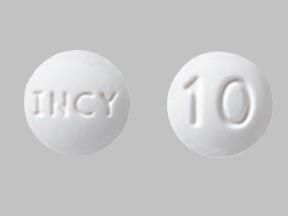Ruxolitinib Interactions
There are 517 drugs known to interact with ruxolitinib, along with 12 disease interactions, and 2 alcohol/food interactions. Of the total drug interactions, 138 are major, 316 are moderate, and 63 are minor.
- View all 517 medications that may interact with ruxolitinib
- View ruxolitinib alcohol/food interactions (2)
- View ruxolitinib disease interactions (12)
Most frequently checked interactions
View interaction reports for ruxolitinib and the medicines listed below.
- Allegra Allergy (fexofenadine)
- Ambien (zolpidem)
- Amrix (cyclobenzaprine)
- Ativan (lorazepam)
- Celexa (citalopram)
- Co-trimoxazole (sulfamethoxazole / trimethoprim)
- Concerta (methylphenidate)
- CoQ10 (ubiquinone)
- Cosopt (dorzolamide / timolol ophthalmic)
- Coumadin (warfarin)
- Eliquis (apixaban)
- Entresto (sacubitril / valsartan)
- Focalin (dexmethylphenidate)
- Heparin Sodium (heparin)
- Humira (adalimumab)
- Lumigan (bimatoprost ophthalmic)
- Metoprolol Tartrate (metoprolol)
- Oramorph SR (morphine)
- Paracetamol (acetaminophen)
- Quercetin (bioflavonoids)
- Retinol (vitamin a topical)
- Rutin (bioflavonoids)
- Singulair (montelukast)
- Sotalol Hydrochloride AF (sotalol)
- Vitamin B Complex 100 (multivitamin)
- Vitamin B12 (cyanocobalamin)
- Vitamin C (ascorbic acid)
- Vitamin D3 (cholecalciferol)
- Xarelto (rivaroxaban)
Ruxolitinib alcohol/food interactions
There are 2 alcohol/food interactions with ruxolitinib.
Ruxolitinib disease interactions
There are 12 disease interactions with ruxolitinib which include:
- cardiovascular risk
- malignancy
- thrombosis
- lung toxicity
- cytopenia
- hepatic impairment
- Hepatitis B
- infections
- lipid elevations
- PML
- renal impairment
- tuberculosis
More about ruxolitinib
- ruxolitinib consumer information
- Compare alternatives
- Reviews (43)
- Side effects
- Dosage information
- During pregnancy
- Drug class: multikinase inhibitors
- Breastfeeding
- En español
Related treatment guides
Drug Interaction Classification
| Highly clinically significant. Avoid combinations; the risk of the interaction outweighs the benefit. | |
| Moderately clinically significant. Usually avoid combinations; use it only under special circumstances. | |
| Minimally clinically significant. Minimize risk; assess risk and consider an alternative drug, take steps to circumvent the interaction risk and/or institute a monitoring plan. | |
| No interaction information available. |
See also:
Further information
Always consult your healthcare provider to ensure the information displayed on this page applies to your personal circumstances.


